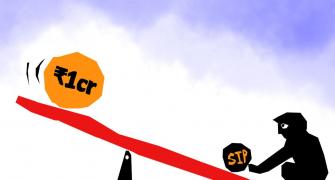Beijing did not announce expected policy support over the weekend
 World stock markets plunged on Monday, as a near 9-per cent dive in China shares and a sharp drop in the dollar and major commodities sent investors rushing for the exit.
World stock markets plunged on Monday, as a near 9-per cent dive in China shares and a sharp drop in the dollar and major commodities sent investors rushing for the exit.
The Dow Jones Industrial Average dropped more than 1,000 points as Wall Street opened, and the benchmark Standard & Poor's 500 index slid more than 2.5 per cent, a drop that puts it nearly 10 per cent below its record high.
A key measure of US equity volatility, the CBOE Volatility Index, or VIX, shot above the 50 mark for the first time since 2009, and the New York Stock Exchange was forced to implement special price-indication measures to allow for a more fluid start to trading.
European stocks were more than 4.7 per cent in the red after Asian shares slumped to 3-year lows as a three month-long rout in Chinese equities threatened to get out of hand.
Oil plunged another 4 per cent, while safe-haven government US and German bonds, and the yen and the euro, rallied as widespread fears of a China-led global economic slowdown and currency war kicked in.
"It is a China-driven macro panic," said Didier Duret, chief investment officer at ABN Amro. "Volatility will persist until we see better data there or strong policy action through forceful monetary easing."
Many traders had hoped that such support measures, which could include an interest rate cut, would have come from Beijing over the weekend after its main stocks markets slumped 11 per cent last week.
With serious doubts also now emerging about the likelihood of a US interest rate rise this year, the dollar slid against other major currencies.
The Australian dollar fell to six-year lows and many emerging market currencies also plunged, while the frantic dash to safety pushed the euro to a 6-1/2-month high above $1.15. The euro briefly shot to as high as $1.17.
"Things are starting look like the Asian financial crisis in the late 1990s. Speculators are selling assets that seem the most vulnerable," said Takako Masai, head of research at Shinsei Bank in Tokyo.
As commodity markets took a fresh battering, Brent and US crude oil futures hit 6-1/2-year lows as concerns about a global supply glut added to worries over potentially weaker demand from the normally resource-hungry China.
US crude was last down 3.3 per cent at about $39 a barrel while Brent dropped to $43.60 barrel to take it under January's lows for the first time.
Copper, seen as a barometer of global industrial demand, tumbled 2.5 per cent, with three-month copper on the London Metal Exchange also hitting a six-year low of $4,920 a tonne. Nickel slid 6 per cent to its lowest since 2009 too at $9,570 a tonne.
Great fall of China
The near 9 per cent slump in Chinese stocks was their worst performance since the depths of the global financial crisis in 2007 and wiped out what was left of the 2015 gains, which in June has been more than 50 per cent.
With the latest slide rooted in disappointment that Beijing did not announce expected policy support over the weekend, all index futures contracts slumped by their 10 per cent daily limit, pointing to more bad days ahead.
MSCI's broadest index of Asia-Pacific shares outside Japan fell 5.1 per cent to a three-year low. Tokyo's Nikkei ended down 4.6 per cent and Australian and Indonesian shares hit two-year troughs.
"China could be forced to devalue the yuan even more, should its economy falter, and the equity markets are dealing with the prospect of a weaker yuan amplifying the negative impact from a sluggish Chinese economy," said Eiji Kinouchi, chief technical analyst at Daiwa Securities in Tokyo.
Just as worrying was evidence that developed markets were becoming synchronised with the troubles. London's FTSE with its large number of global miners and oil firms, was down for its 10th straight day, its worst run since 2003.
The pan-European FTSEurofirst 300 was last down 5 per cent at 1,355 points, wiping around 400 billion euros ($460.16 billion) off the index and taking its losses for the month to more than 1 trillion euros.
"We are in the midst of a full-blown growth scare," strategists at JP Morgan Cazenove said in a note.
(Reporting by Sinead Carew; Editing by Nick Zieminski)








